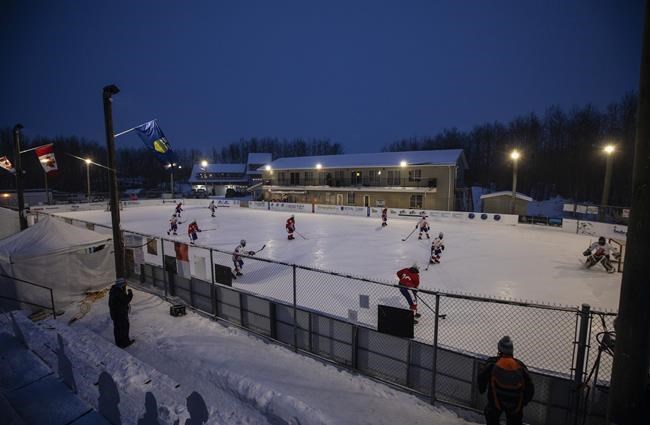CALGARY — It's a game of chance for thousands of Albertans playing group sports as the Omicron COVID-19 variant rips through the province.
But some sports and recreation organizations say operating tournaments and leagues as safely as possible is worth the risk to support players' mental and physical health.
Both Calgary and Edmonton are hosting separate hockey tournaments this week with about 600 teams each and a new season of adult recreational leagues — with tens of thousands of players — is set to kick off.
"This season will likely be our most challenging just due to the speed at which Omicron is spreading in the province," said Jon Diment, program manager of the Calgary Sports and Social Club.
"There is inevitably going to be more players out there who will have (COVID-19) compared to the fall or summer season."
There are now over 61,000 active COVID-19 cases in Alberta but Dr. Deena Hinshaw, the chief medical officer of health, has said those case numbers are low and the actual infections are likely 10 times higher.
Diment said the club had no trouble selling out its various coed leagues for the upcoming winter season, set to begin Monday.
The league offers 15 different sports and has a sister organization in Edmonton, making it the largest recreational sports provider in Alberta.
Unlike previous seasons, players must now provide proof of vaccination against COVID-19 to play. The club no longer accepts rapid tests or medical exemptions from registered players.
Diment said this decision was made to increase safety among players and to allow for easier scheduling at sports facilities, which have varying rules for entry.
"We've been big advocates ... for allowing sports and fitness to get back out there for physical and mental fitness," said Diment, who added that people seem more willing now to take on the COVID-19 threat than when the pandemic began.
"Having numerous periods of (time) where you couldn't do much really had an effect on people," he said.
Only facilities that are not using Alberta's vaccine passport system are barred from running adult indoor group sport, fitness or performance activities, unless granted an exemption.
Indoor one-on-one training and solo activities are permitted with three-metre physical distancing.
There are no restrictions on outdoor activities.
Different rules are in place for youth.
Indoor activities are permitted so long as participants screen for symptoms and masks are only required for those under 18 if they are not engaged in physical activity. Spectators are also limited.
Quikcard Edmonton Minor Hockey Week returned to the capital after being cancelled last year because of COVID-19. More than 9,000 players from about 600 local teams are competing in a weeklong tournament, ending Sunday.
The Esso Minor Hockey Week in Calgary has also come back with a similar-sized roster hitting the ice this week.
Hockey Edmonton general manager Steve Hogle said they are trying to operate as safely as possible, with input from Alberta Health Services, the City of Edmonton and Hockey Alberta.
"No matter where you are, you have to be on guard," said Hogle. "We're just constantly reminding all our members, all the players, all the parents of all the provisions they need to do."
He said they are following all government rules and have added some additional safety measures to reduce interactions. Medals, for example, will be given to coaches instead of handed out by dignitaries.
There were 19 teams that backed out of the tournament because of positive COVID-19 cases before its start. Similarly, 12 teams dropped out in Calgary for the same reason.
Hockey Calgary executive director Kevin Kobelka said no teams from outside the city are playing, eliminating the risk of exposure from travelling players.
They are also asking participants to leave the rink immediately after playing to limit interactions.
"It has been a very difficult year for the kids. They've lost a lot," said Kobelka.
"To get them back and having fun and enjoying the game they love is important for their overall mental health. So, if we can do it safely and we can follow the rules, then we will continue."
This report by The Canadian Press was first published Jan. 13, 2021.
Alanna Smith, The Canadian Press



